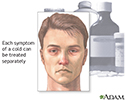Colds and the flu - what to ask your doctor - child
What to ask your doctor about colds and the flu - child; Influenza - what to ask your doctor - child; Upper respiratory infection - what to ask your doctor - child; URI - what to ask your doctor - child; Swine flu (H1N1) - what to ask your doctor - childMany different germs, called viruses, cause colds. Symptoms of the common cold include:
Colds
The common cold most often causes a runny nose, nasal congestion, and sneezing. You may also have a sore throat, cough, headache, or other symptoms....

- Runny nose
- Nasal congestion
- Sneezing
- Sore throat
- Cough
- Headache
The flu is an infection of the nose, throat, and lungs caused by the influenza virus. COVID-19 is an illness that can cause many symptoms similar to a cold. It is caused by the SARS-CoV-2 virus.
Flu
The flu (influenza) is a viral respiratory illness that causes fever, chills, runny nose, body aches, and cough. It spreads easily from person to pe...

Below are some questions you may want to ask your child's health care provider to help you take care of your child with a cold or the flu.
Questions
What are the symptoms of a cold? What are the symptoms of the flu and COVID-19? How can I tell a cold apart from these illnesses?
- Will my child have a fever? How high? How long will it last? Can a high fever be dangerous? Do I need to worry about my child having febrile seizures?
Febrile seizures
A febrile seizure is a convulsion in a child triggered by a fever.
 ImageRead Article Now Book Mark Article
ImageRead Article Now Book Mark Article - Will my child have a cough? Sore throat? Runny nose? Headache? Other symptoms? How long will these symptoms last? Will my child be tired or achy?
- How will I know if my child has an ear infection? How will I know if my child has pneumonia?
Pneumonia
Pneumonia is a lung infection caused by bacteria, viruses, or fungi. This article covers community-acquired pneumonia (CAP) in children. This type o...
 ImageRead Article Now Book Mark Article
ImageRead Article Now Book Mark Article - How will I know if my child has swine flu (H1N1) or another type of flu?
Swine flu
The H1N1 virus (swine flu) is an infection of the nose, throat, and lungs. It is caused by the H1N1 influenza virus.
Read Article Now Book Mark Article
Can other people become sick from being around my child? How can I prevent that? What should I do if I have other young children at home? How about somebody who is an older adult?
When will my child start to feel better? When should I worry if my child's symptoms have not gone away?
What should my child eat or drink? How much? How will I know if my child is not drinking enough?
What medicines can I buy at the store to help with my child's symptoms?
- Can my child take aspirin or ibuprofen (Advil, Motrin)? How about acetaminophen (Tylenol)?
- Can my child take cold medicines?
- Can my child's provider prescribe stronger medicines to help the symptoms?
- Can my child take vitamins or herbs to make the cold or flu go away quicker? How do I know if the vitamins or herbs are safe?
Will antibiotics make my child's symptoms go away faster? Are there medicines that can make the flu go away faster?
How can I keep my child from getting a cold or the flu?
- Can children have flu shots? What time of year should the flu shot be given? Does my child need one or two flu shots every year? What are the risks of the flu shot? What are the risks for my child by not getting a flu shot? Does the regular flu shot protect my child against swine flu?
- Will a flu shot keep my child from getting colds all year long?
- Can being around smokers cause my child to get the flu more easily?
- Can my child take vitamins or herbs to prevent the flu?
References
Centers for Disease Control and Prevention website. Influenza (Flu): about influenza. www.cdc.gov/flu/about/. Updated August 13, 2024. Accessed September 30, 2025.
Centers for Disease Control and Prevention website. Influenza (Flu): what to do if you get sick. www.cdc.gov/flu/takingcare/. Updated August 30, 2024. Accessed September 30, 2025.
Cherry JD. The common cold. In: Cherry JD, Kaplan SL, Harrison GJ, Steinbach WJ, Hotez PJ, eds. Feigin and Cherry's Textbook of Pediatric Infectious Diseases. 9th ed. Philadelphia, PA: Elsevier; 2025:chap 7.
Ortiz JR, West TE. Influenza. In: Broaddus VC, Ernst JD, King TE, et al, eds. Murray and Nadel's Textbook of Respiratory Medicine. 7th ed. Philadelphia, PA: Elsevier; 2022:chap 47.
-
Cold remedies - illustration
Sore throat, cough, stuffy nose, sneezing, runny nose, fever, chills, and muscle aches are all symptoms associated with the common cold. Over-the-counter medicines for a cold only alleviate cold symptoms but do not shorten the duration of a cold. As always, drinking plenty of fluids and rest are most important for recovery from a cold.
Cold remedies
illustration
-
Cold remedies - illustration
Sore throat, cough, stuffy nose, sneezing, runny nose, fever, chills, and muscle aches are all symptoms associated with the common cold. Over-the-counter medicines for a cold only alleviate cold symptoms but do not shorten the duration of a cold. As always, drinking plenty of fluids and rest are most important for recovery from a cold.
Cold remedies
illustration
Review Date: 10/1/2025
Reviewed By: Charles I. Schwartz, MD, FAAP, Clinical Assistant Professor of Pediatrics, Regional Medical Director of Penn Medicine Primary and Specialty Care, Perelman School of Medicine at the University of Pennsylvania, General Pediatrician at PennCare for Kids, Phoenixville, PA. Also reviewed by David C. Dugdale, MD, Medical Director, Brenda Conaway, Editorial Director, and the A.D.A.M. Editorial team.


